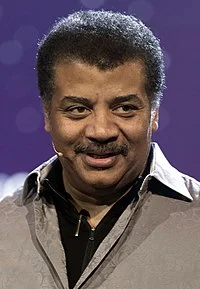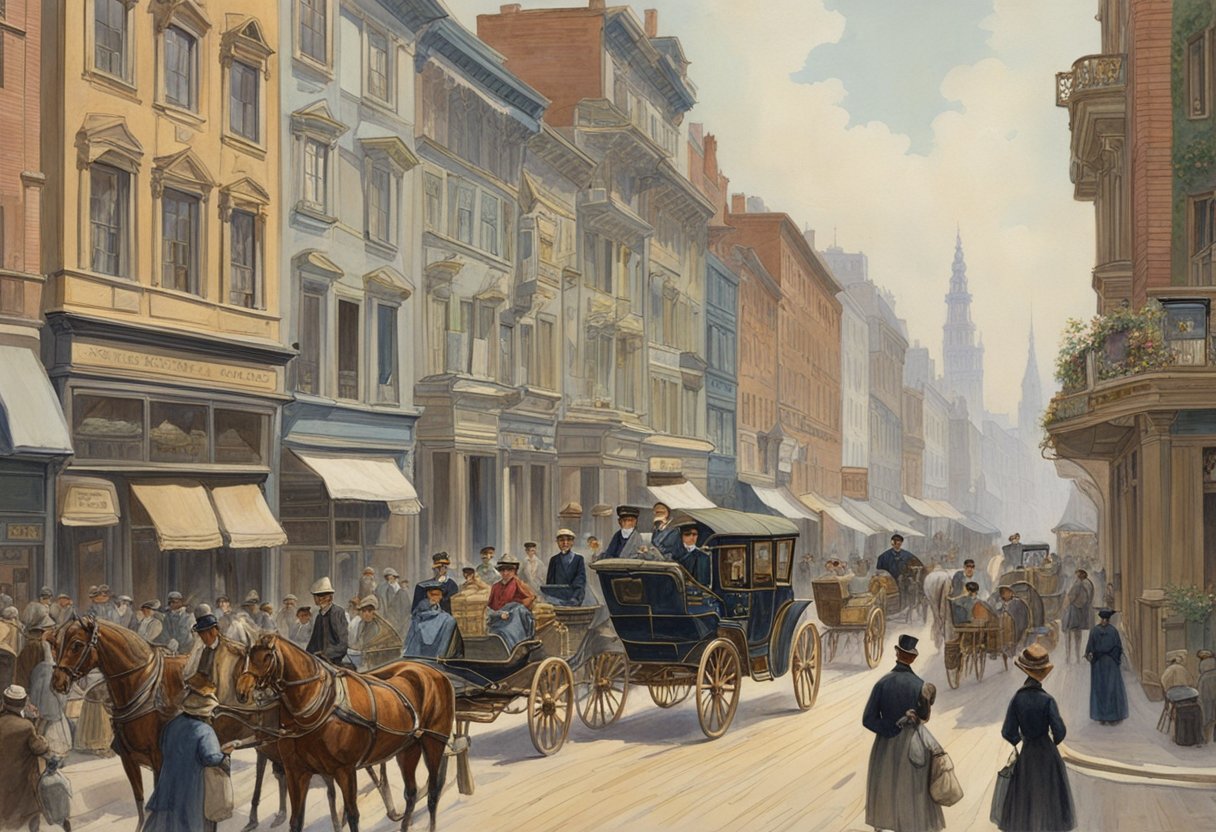
Neil deGrasse Tyson
Neil deGrasse Tyson is an American astrophysicist, author, and science communicator. Tyson studied at Harvard University, the University of Texas at Austin, and Columbia University. From 1991 to 1994, he was a postdoctoral research associate at Princeton University. In 1994, he joined the Hayden Planetarium as a staff scientist and the Princeton faculty as a visiting research scientist and lecturer. In 1996, he became director of the planetarium and oversaw its $210 million reconstruction project, which was completed in 2000. Since 1996, he has been the director of the Hayden Planetarium at the Rose Center for Earth and Space in New York City. The center is part of the American Museum of Natural History, where Tyson founded the Department of Astrophysics in 1997 and has been a research associate in the department since 2003.
Books Mentioned on The Joe Rogan Experience (JRE) #1904 - Joe Rogan & Neil deGrasse Tyson:
JRE 1904: Neil deGrasse Tyson
JRE 1904 is a podcast episode of The Joe Rogan Experience featuring astrophysicist Neil deGrasse Tyson. The episode was released on November 30, 2022, and has since garnered widespread attention from fans of the podcast and science enthusiasts alike. In this episode, Tyson discusses a range of topics including his work at the Hayden Planetarium, his radio show StarTalk, and his contributions to science.

During the podcast, Tyson provides an overview of his work at the Hayden Planetarium, which is located at the American Museum of Natural History in New York City. He discusses the planetarium's mission to educate the public about astronomy and space science, as well as the various exhibits and programs that are offered to visitors. Additionally, Tyson talks about his radio show StarTalk, which is a popular science program that covers a range of topics related to astronomy, physics, and space exploration.
Key Takeaways
- JRE 1904 is a podcast episode of The Joe Rogan Experience featuring astrophysicist Neil deGrasse Tyson.
- Tyson discusses his work at the Hayden Planetarium and his radio show StarTalk during the episode.
- The episode provides insight into Tyson's contributions to science and his passion for educating the public about astronomy and space science.
Overview of JRE 1904

JRE 1904 is an episode of the Joe Rogan Experience podcast that aired on November 30, 2022. The guest on this episode was Neil deGrasse Tyson, an astrophysicist, author, and science communicator. The episode had a runtime of 2 hours and 52 minutes, making it one of the longer episodes of the podcast.
During the podcast, Joe Rogan and Neil deGrasse Tyson had a wide-ranging conversation covering various topics such as the future of space exploration, the search for extraterrestrial life, the importance of science education, and the impact of technology on society. They also discussed Tyson's latest book, "Starry Messenger: Cosmic Perspectives on Civilization," which explores the role of science and technology in shaping human civilization.
JRE 1904 was well-received by fans of the Joe Rogan Experience podcast, with many praising the informative and engaging conversation between Rogan and Tyson. The episode has also been shared widely on social media platforms such as Twitter and Reddit, with fans discussing and sharing their favorite moments from the podcast.
Overall, JRE 1904 is a must-listen episode for fans of the Joe Rogan Experience podcast and anyone interested in science, technology, and the future of humanity.
Guest Profile: Neil deGrasse Tyson
https://www.youtube.com/watch?v=FoLbVNzdPY4&embed=true
Neil deGrasse Tyson is an astrophysicist, science communicator, and the Frederick P. Rose Director of the Hayden Planetarium and the Department of Astrophysics at the American Museum of Natural History. He is a well-known public figure who has been featured in numerous documentaries, TV shows, and podcasts.
Tyson is an accomplished author, having written several books on astrophysics, including "Astrophysics for People in a Hurry" and "The Pluto Files". He is also the host of the popular radio show and podcast "StarTalk Radio", where he discusses various scientific topics with celebrity guests.
In addition to his work in astrophysics and science communication, Tyson has also served as a consultant for numerous TV shows and movies, including "Cosmos: A Spacetime Odyssey" and "Interstellar".
Tyson has received numerous awards and honors for his contributions to science and education, including the NASA Distinguished Public Service Medal and the Stephen Hawking Medal for Science Communication.
Overall, Neil deGrasse Tyson is a highly respected and influential figure in the world of astrophysics and science communication. His work has helped to inspire a new generation of scientists and science enthusiasts, and his contributions to the field will continue to be felt for many years to come.
Hayden Planetarium and American Museum of Natural History
https://www.youtube.com/watch?v=99RRB42VLuM&embed=true
The Hayden Planetarium at the American Museum of Natural History in New York City is one of the most popular attractions for astronomy enthusiasts and science lovers. The planetarium was founded in 1935 and was the fourth planetarium to open in the United States. It has since become a center for astrophysics research and education, with Neil deGrasse Tyson serving as its current director.
The planetarium has a 429-seat Space Theater that offers a range of shows and presentations on astronomy and space exploration. Visitors can experience immersive shows that simulate the night sky, explore the solar system, and dive into the depths of the universe. The theater also hosts live presentations by scientists and educators who share their knowledge and insights on the latest discoveries in astrophysics.
The American Museum of Natural History is home to the Hayden Planetarium and is one of the largest natural history museums in the world. The museum's collections contain over 34 million specimens and artifacts, including fossils, minerals, and cultural artifacts from around the globe. The museum's exhibits cover a range of topics, from human evolution to biodiversity to the history of the universe.
Visitors to the museum can explore the Rose Center for Earth and Space, which houses the Hayden Planetarium, as well as exhibits on the Big Bang, the formation of the solar system, and the search for life beyond Earth. The museum also offers educational programs and events for all ages, including lectures, workshops, and hands-on activities.
Overall, the Hayden Planetarium and American Museum of Natural History offer a unique and exciting opportunity to explore the wonders of the universe and the natural world. With its state-of-the-art facilities, world-class collections, and knowledgeable staff, it is a must-visit destination for anyone interested in science and astronomy.
Startalk: Tyson's Radio Show

Neil deGrasse Tyson is not only an astrophysicist, but he is also the host of "StarTalk Radio," a science-based radio show. The show is a platform for Tyson to bring his scientific knowledge and expertise to the masses in an accessible and entertaining way.
"StarTalk Radio" has been on the air since 2009 and has since become a popular podcast. The show covers a wide range of topics, from space exploration to the science of cooking. Tyson often invites guests to join him on the show, including celebrities, scientists, and experts in various fields.
One of the unique aspects of "StarTalk Radio" is that it is not only informative but also entertaining. Tyson and his guests often inject humor into their discussions, making complicated scientific concepts more approachable for the average listener.
Overall, "StarTalk Radio" is a great resource for anyone interested in science and looking to learn more about the world around them. With its combination of informative discussions and entertaining banter, it is no wonder that the show has become so popular over the years.
| Pros | Cons |
|---|---|
| Informative | May not be suitable for those looking for a more serious discussion |
| Entertaining | Some may find the humor distracting |
| Accessible | Guests may not always be experts in the field being discussed |
In conclusion, "StarTalk Radio" is a great example of how science can be made accessible and entertaining for everyone. Tyson's expertise and engaging personality make the show a must-listen for anyone interested in learning more about the world around them.
Tyson's Contribution to Science
https://www.youtube.com/watch?v=J4c8_fIoTwc&embed=true
Neil deGrasse Tyson is an astrophysicist with an impressive and significant contribution to science. He has authored several books, including "Astrophysics for People in a Hurry" and "Death by Black Hole," which are accessible to a general audience and provide a clear understanding of complex scientific concepts.
Tyson's work extends beyond his books. He has also hosted and participated in several science documentaries, including "Cosmos: A Spacetime Odyssey" and "NOVA ScienceNOW." These documentaries have helped bring science to a wider audience and have inspired many to pursue a career in science.
In "Astrophysics for People in a Hurry," Tyson provides a concise and accessible overview of the universe, explaining complex concepts such as dark matter and dark energy in a clear and concise manner. This book has been praised for its ability to make science accessible to a general audience.
In "Death by Black Hole," Tyson delves into the mysteries of the universe, exploring topics such as the origins of the universe and the possibility of life on other planets. This book is written in a conversational style and is accessible to readers with little to no background in science.
Tyson's work on "Cosmos: A Spacetime Odyssey" and "NOVA ScienceNOW" has also been instrumental in bringing science to a wider audience. These documentaries explore a wide range of topics, from the origins of the universe to the inner workings of the human brain. Through these documentaries, Tyson has helped inspire a new generation of scientists and science enthusiasts.
Overall, Neil deGrasse Tyson's contribution to science has been significant. His work has helped make science accessible to a wider audience, inspiring many to pursue a career in science and deepening our understanding of the universe.
Music and Commission in JRE 1904

In JRE 1904, Neil deGrasse Tyson discusses a wide range of topics, including music and commission. Tyson touches on how music can be a powerful tool in conveying emotion and how it can be used to enhance the impact of a message. He also talks about how commission can be a way to incentivize people to create something that they might not have otherwise.
During the podcast, Tyson mentions how he was commissioned to write a piece of music for the 2017 solar eclipse. He explains how he worked with a composer to create a piece that would evoke the feeling of the eclipse and convey the awe-inspiring nature of the event. The resulting piece, titled "Asteroid Blues: A Solar Eclipse Celebration," was performed at the Hollywood Bowl.
Tyson also discusses how commission can be used to incentivize people to create something that they might not have otherwise. He gives the example of how he was commissioned to write a book about the universe. Tyson explains how the commission gave him the motivation to complete the book and how it helped him to focus his efforts.
Overall, Tyson's discussion of music and commission in JRE 1904 highlights how these two concepts can be used to inspire and motivate people to create something that is meaningful and impactful. By using these tools, people can tap into their creativity and produce works that are both beautiful and thought-provoking.
Frequently Asked Questions
https://www.youtube.com/watch?v=v3dcCKVGTHM&embed=true
What is the history of JRE?
The Joe Rogan Experience (JRE) is a podcast hosted by comedian and UFC commentator Joe Rogan. The podcast began in 2009 and has since become one of the most popular podcasts in the world. The show features a wide range of guests, including comedians, scientists, politicians, and athletes.
Who are some notable guests on JRE?
JRE has had a number of notable guests over the years, including Elon Musk, Bernie Sanders, Jordan Peterson, and Neil deGrasse Tyson, among many others. The show is known for its eclectic mix of guests and wide range of topics.
What is the format of JRE?
JRE is an interview-style podcast, with Joe Rogan sitting down with a guest for a conversation that can last anywhere from one to four hours. The show is known for its casual, conversational style, with Rogan and his guests discussing a wide range of topics, from politics and science to comedy and pop culture.
What are some popular JRE episodes?
Some of the most popular episodes of JRE include Elon Musk's appearance on the show in 2018, which has been viewed over 35 million times on YouTube, and Jordan Peterson's appearance in 2017, which has been viewed over 20 million times.
How does JRE compare to other podcasts?
JRE is one of the most popular podcasts in the world, with millions of listeners tuning in each week. The show is known for its wide range of guests and topics, as well as its casual, conversational style. While there are many other podcasts out there, JRE stands out for its unique blend of humor, intelligence, and curiosity.
What are some criticisms of JRE?
While JRE has a large and dedicated fanbase, it has also been the subject of some criticism. Some have accused Rogan of giving a platform to controversial guests and promoting conspiracy theories. Others have criticized the show for its lack of diversity, both in terms of its guests and its audience. Despite these criticisms, JRE remains one of the most popular and influential podcasts in the world.








